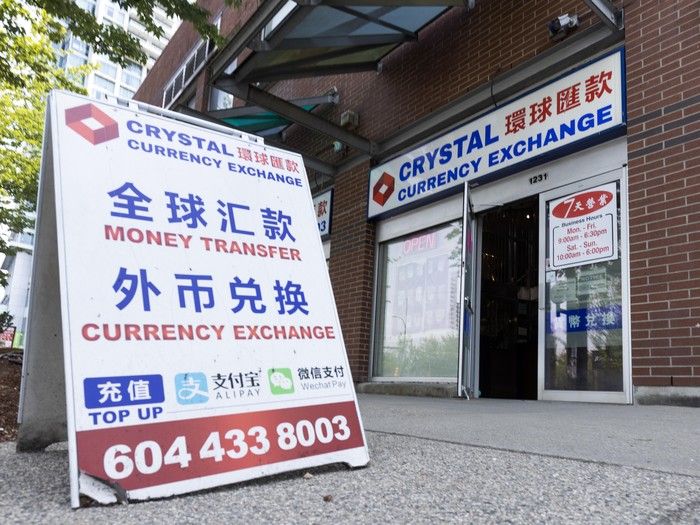
More than two years after the B.C. government announced new oversight of businesses that deal in foreign exchanges, wire transfers and money orders because they can be conduits of money laundering, the laws are still not in force.
In 2023, Premier David Eby’s government introduced new legislation to monitor and regulate so-called money services businesses through the B.C. Financial Services Authority. Money services businesses include currency exchanges and businesses that send money outside of Canada. There are more than 700 in B.C., most of them in Metro Vancouver.
While a new Money Services Business Act was introduced on March 29, 2023 and later passed, it remains a legislative shell. There are no powers because regulations that set out the rules and penalties have not been created. The details of those regulations are still to be worked out, and no deadline has been set.
Ron Usher, a former general counsel for the Society of Notaries Public of B.C., said he understands that putting in place new laws can be complex and takes time.
“But we can’t pretend to the public we are doing stuff and not do it,” said Usher, who testified at the Cullen commission into money laundering and was involved in the receivership of one of B.C.’s largest Ponzi schemes.
In a written response sent by public affairs officer Shantel Esplen, the provincial Ministry of Finance said it is working “closely” with the B.C. Financial Services Authority on the details of regulatory oversight and the date the new regulations will come into force.
The ministry did not respond to questions about why there has been a two-year delay, or say what is that date.
The ministry said it was engaging with industry officials and regulatory counterparts from across the country and also reviewing changes to the federal regulatory regimes related to money services businesses that have been implemented since the province’s legislation was introduced.
Usher noted that another problem is if the province brings in new regulations and doesn’t properly fund enforcement, nothing will change.
That is why government has to take a hard look at whether it has the competency and funding to put in place new regulations, he said.
If it doesn’t — or something has changed that makes the new law no longer necessary — it should be honest and say so, said Usher.
In announcing the legislation in 2023, Katrine Conroy, then the minister of finance, said money services businesses would be required to register with the B.C. Financial Services Authority and require background checks and annual reporting to keep “bad actors” out.
The province has said the Financial Services Authority — a regulatory agency that also has oversight over credit unions and real estate services — will have investigative and enforcement powers to help protect people from unknowingly working with unregistered or criminally linked businesses.
In a written statement, the financial services authority said it is supporting the Ministry of Finance as it develops the regulations.
If B.C. regulates money service businesses, it will join Quebec as the second province in Canada to do so.
Money services business do face some federal regulations.
A federal agency, the Financial Transactions and Reports Analysis Centre of Canada, often called Fintrac , has handed out fines of $950,000 to five currency exchanges in B.C. in the past year for not having in place policies and practices to deter money laundering.
That includes Crystal Currency Exchange in Burnaby that was fined nearly $350,000 last month over nine violations that Fintrac said included failing to submit suspicious transactions and report large cash transactions of more than $10,000, failing to appoint a compliance officer, failing to develop written compliance policies and failing to assess and document the risk of money laundering.
Crystal Currency has appealed the penalty to the Federal Court of Canada.
In its court filings, the Burnaby currency exchange says the penalty was overly punitive, failed to account for its ability to pay, and did not consider mitigating factors.
B.C.’s move to regulate money service businesses is a result of recommendations from several inquiries.
Three years ago, the B.C. government-commissioned Cullen inquiry into money laundering concluded that money services businesses pose a significant money laundering risk and should be regulated by the province.
The inquiry pointed to evidence uncovered by the RCMP in 2015 that as much as $220 million a year was being laundered through an unlicensed money services business in Richmond.
Other B.C. examples include a $200-million laundering operation in the early 2000s that operated as a currency exchange out of a Burnaby home. In 2014, a currency exchange in downtown Vancouver was at the centre of a criminal case where $24 million in drug money was allegedly laundered.
Two earlier B.C. government-commissioned reports — former RCMP superintendent Peter German’s 2018 report into money laundering in casinos and a 2019 report into money laundering in real estate — made similar recommendations to regulate money services businesses.
A 2019 investigation by Postmedia found that dozens of money services business were operating out of condos and houses, and some directors were linked to alleged criminal activity.